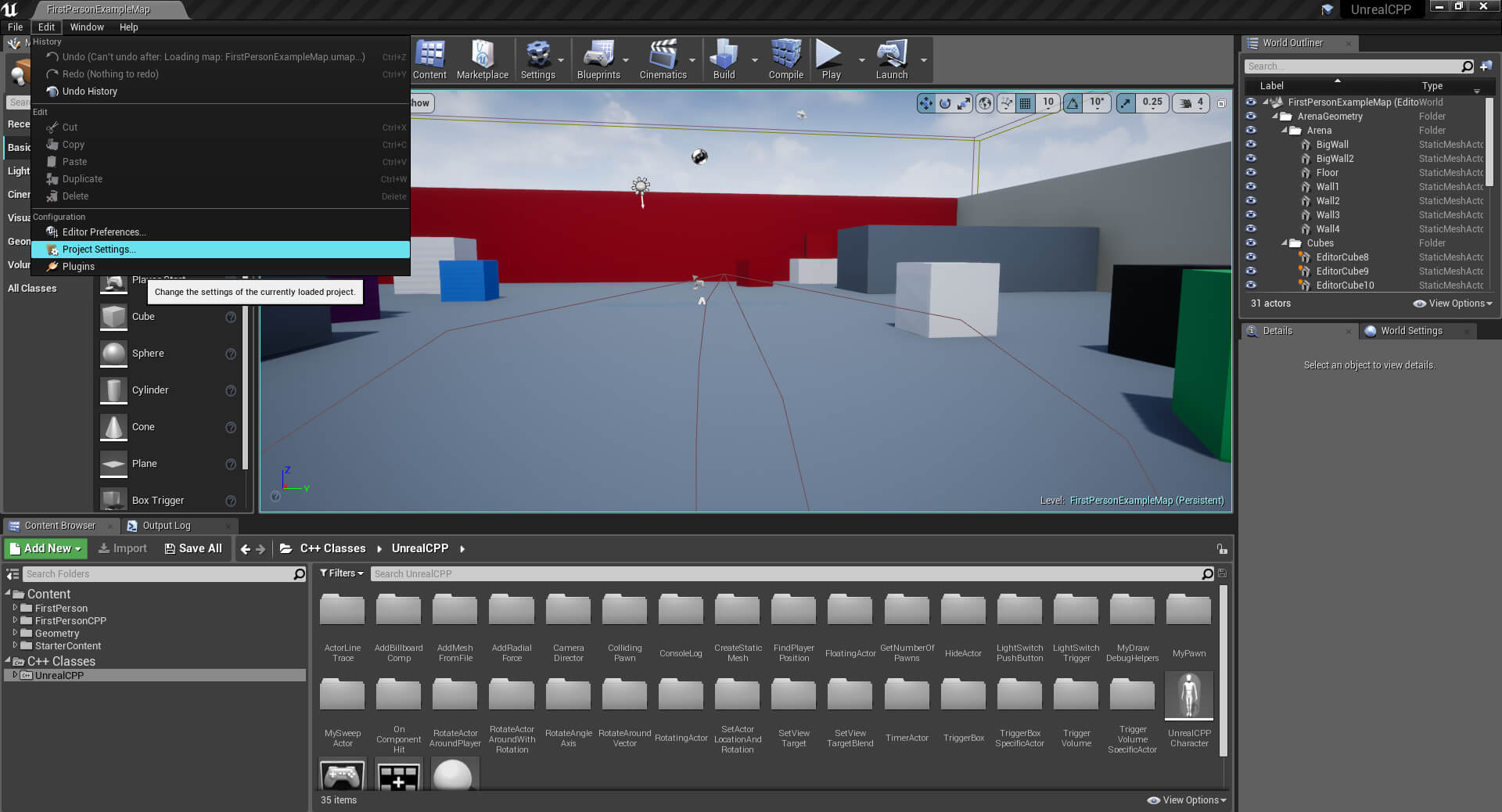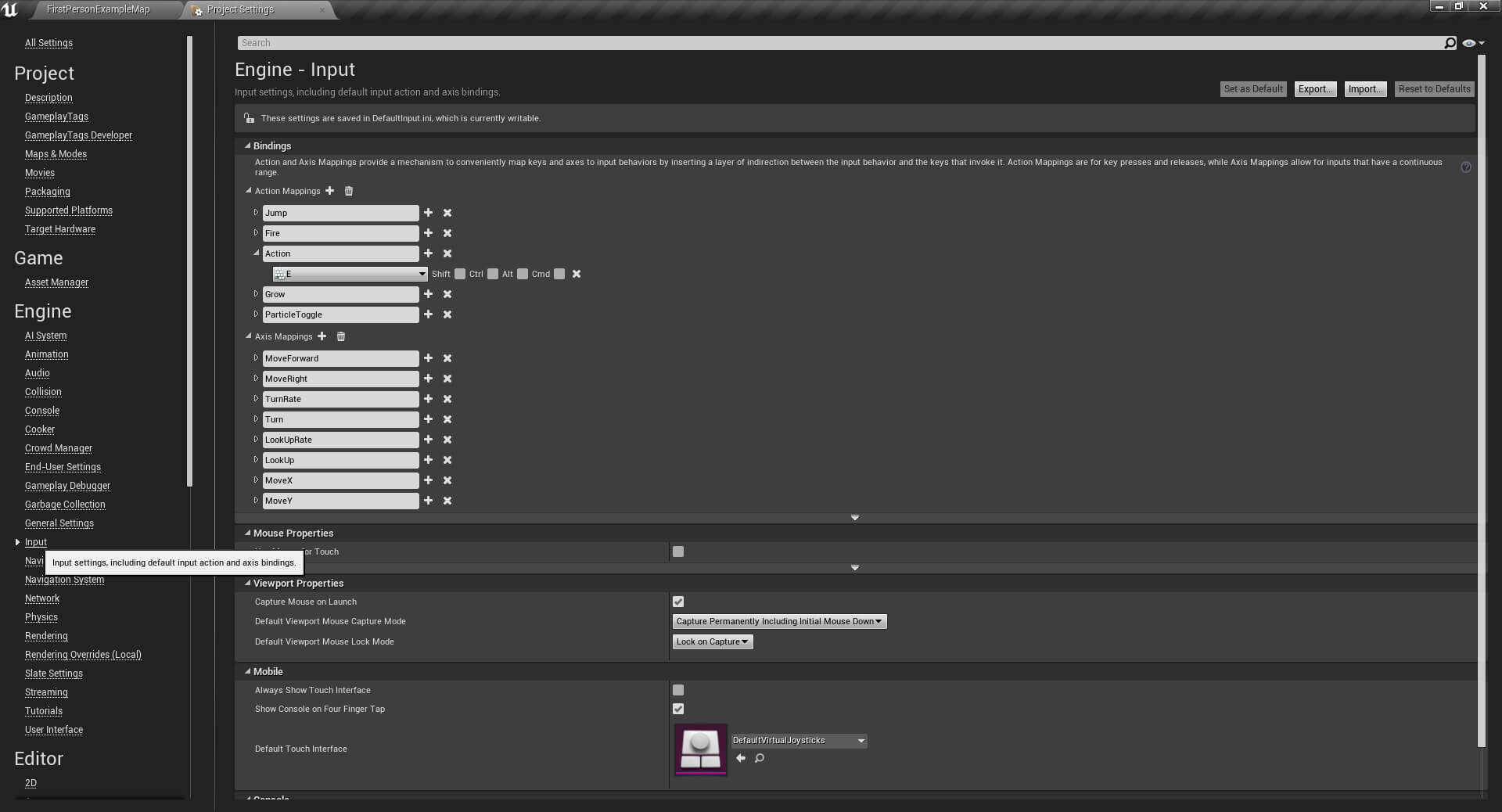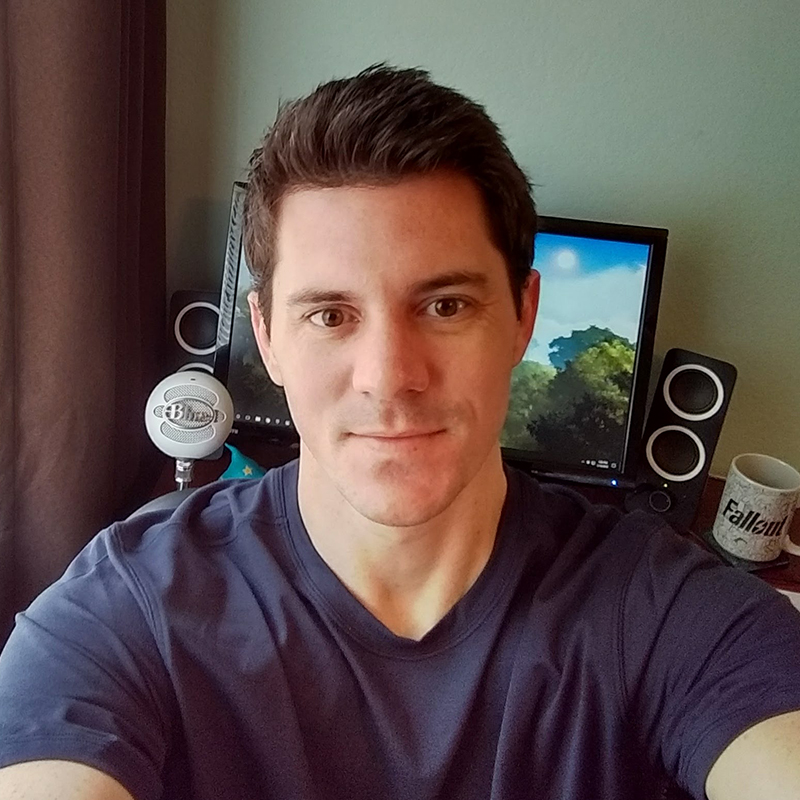Light Switch on Button Press
Github Link: https://github.com/Harrison1/unrealcpp/tree/master/LightSwitchPushButton
For this tutorial we are using the standard first person C++ template with starter content. If you don't know how to add a new actor class to your project, please visit the Add C++ Actor Class post.
Create a new C++ actor class and call it LightSwitchPushButton. We are going to define four variables in the header file. We are going to define a UPointLightComponent, USphereComponent, float, and void function. Below is the final header code.
LightSwitchPushButton.h
#pragma once
#include "CoreMinimal.h"
#include "GameFramework/Actor.h"
#include "LightSwitchPushButton.generated.h"
UCLASS()
class UNREALCPP_API ALightSwitchPushButton : public AActor
{
GENERATED_BODY()
public:
// Sets default values for this actor's properties
ALightSwitchPushButton();
protected:
// Called when the game starts or when spawned
virtual void BeginPlay() override;
public:
// Called every frame
// virtual void Tick(float DeltaTime) override;
// declare point light comp
UPROPERTY(VisibleAnywhere, Category = "Light Switch")
class UPointLightComponent* PointLight;
// declare sphere comp
UPROPERTY(VisibleAnywhere, Category = "Light Switch")
class USphereComponent* LightSphere;
// declare light intensity variable
UPROPERTY(VisibleAnywhere, Category = "Light Switch")
float LightIntensity;
// declare ToggleLight function
UFUNCTION(BlueprintCallable, Category = "Light Switch")
void ToggleLight();
};
Next, in our .cpp file let's first #include the necessary scripts we'll be using in our code. Include the Components/PointLightComponent.h and Components/SphereComponent.h files.
include header files
#include "LightSwitchPushButton.h"
// include these header files
#include "Components/PointLightComponent.h"
#include "Components/SphereComponent.h"We'll setup all the default properties of the actor in its init function. First let's set our float, LightIntensity to 3000.0f, it will make the light bright enough to see it against objects. Next, we'll create our UPointLightComponent and set it as our RootComponent. After that we'll create our USphereComponent that will serve as the collision sphere for when our player get's inside the radius. Then, we'll create the simple ToggleLight() function that will toggle the light's visibility state. We'll call the the function from the the character script later on. Below is the final .cpp file for the LightSwitchPushButton actor.
LightSwitchPushButton.cpp
#include "LightSwitchPushButton.h"
#include "Components/PointLightComponent.h"
#include "Components/SphereComponent.h"
// Sets default values
ALightSwitchPushButton::ALightSwitchPushButton()
{
// Set this actor to call Tick() every frame. You can turn this off to improve performance if you don't need it.
PrimaryActorTick.bCanEverTick = true;
LightIntensity = 3000.0f;
PointLight = CreateDefaultSubobject<UPointLightComponent>(TEXT("Point Light"));
PointLight->Intensity = LightIntensity;
PointLight->bVisible = true;
RootComponent = PointLight;
LightSphere = CreateDefaultSubobject<USphereComponent>(TEXT("Light Sphere Component"));
LightSphere->InitSphereRadius(300.0f);
LightSphere->SetCollisionProfileName(TEXT("Trigger"));
LightSphere->SetCollisionResponseToChannel(ECC_Pawn, ECR_Ignore);
LightSphere->SetupAttachment(RootComponent);
}
// Called when the game starts or when spawned
void ALightSwitchPushButton::BeginPlay()
{
Super::BeginPlay();
}
void ALightSwitchPushButton::ToggleLight()
{
PointLight->ToggleVisibility();
}Next, let's add an Action input to our project. In this case we are going to bind the Action input to our keyboard's E key. Go to Edit > Project Settings. Then select the Input option. Click the plus sign next to Action Mappings. Call the new input Action and select E from the dropdown menu.
open Edit > Project Settings
go to the Input options and a button press
In our Character.h file add the OnAction method under the OnFire method. My header file in this tutorial is called UnrealCPPCharacter.h, your file might be called something different.
add OnAction to the header file
protected:
/** Fires a projectile. */
void OnFire();
// on action
void OnAction();We will have to also include our LightSwitchPushButton header file so our character can access its functions.
include LightSwitchPushButton
#include "CoreMinimal.h"
#include "GameFramework/Character.h"
// include our new LightSwitchPushButton header file
#include "LightSwitchPushButton/LightSwitchPushButton.h"
#include "UnrealCPPCharacter.generated.h"Then declare a variable for the light switch the player is currently overlapping. Also, we will need to declare overlap events to trigger the functions we want to run when the player is inside the radius of the light's sphere component.
// declare overlap begin function
UFUNCTION()
void OnOverlapBegin(class UPrimitiveComponent* OverlappedComp, class AActor* OtherActor, class UPrimitiveComponent* OtherComp, int32 OtherBodyIndex, bool bFromSweep, const FHitResult& SweepResult);
// declare overlap end function
UFUNCTION()
void OnOverlapEnd(class UPrimitiveComponent* OverlappedComp, class AActor* OtherActor, class UPrimitiveComponent* OtherComp, int32 OtherBodyIndex);
// declare current light switch
class ALightSwitchPushButton* CurrentLightSwitch;We are also going to have to declare a UCapsuleComponent to handle our trigger events.
UPROPERTY(VisibleAnywhere, Category = "Trigger Capsule")
class UCapsuleComponent* TriggerCapsule;Inside the init function add the trigger capsule and connect bind it to the overlap events. Them, set the variable CurrentLightSwitch to NULL.
setup up trigger capsule and variable
AUnrealCPPCharacter::AUnrealCPPCharacter()
{
...
// create trigger capsule
TriggerCapsule = CreateDefaultSubobject<UCapsuleComponent>(TEXT("Trigger Capsule"));
TriggerCapsule->InitCapsuleSize(55.f, 96.0f);;
TriggerCapsule->SetCollisionProfileName(TEXT("Trigger"));
TriggerCapsule->SetupAttachment(RootComponent);
// bind trigger events
TriggerCapsule->OnComponentBeginOverlap.AddDynamic(this, &AUnrealCPPCharacter::OnOverlapBegin);
TriggerCapsule->OnComponentEndOverlap.AddDynamic(this, &AUnrealCPPCharacter::OnOverlapEnd);
// set current light switch to null
CurrentLightSwitch = NULL;
}Connect the Action input to the character
bind action input
void AUnrealCPPCharacter::SetupPlayerInputComponent(class UInputComponent* PlayerInputComponent)
{
...
// Bind action event
PlayerInputComponent->BindAction("Action", IE_Pressed, this, &AUnrealCPPCharacter::OnAction);
}
Add the OnAction() function to the character script. The function will check if a CurrentLightSwitch is NULL or not. If the CurrentLightSwicth is not NULL, then when the player presses the Action key, E, the light will toggle the light's visibility. Then, add the Overlap functions to set and unset CurrentLightSwitch
OnAction and Overlap functions
void AUnrealCPPCharacter::OnAction()
{
if(CurrentLightSwitch)
{
CurrentLightSwitch->ToggleLight();
}
}
// overlap on begin function
void AUnrealCPPCharacter::OnOverlapBegin(class UPrimitiveComponent* OverlappedComp, class AActor* OtherActor, class UPrimitiveComponent* OtherComp, int32 OtherBodyIndex, bool bFromSweep, const FHitResult& SweepResult)
{
if (OtherActor && (OtherActor != this) && OtherComp && OtherActor->GetClass()->IsChildOf(ALightSwitchPushButton::StaticClass()))
{
CurrentLightSwitch = Cast<ALightSwitchPushButton>(OtherActor);
}
}
// overlap on end function
void AUnrealCPPCharacter::OnOverlapEnd(class UPrimitiveComponent* OverlappedComp, class AActor* OtherActor, class UPrimitiveComponent* OtherComp, int32 OtherBodyIndex)
{
if (OtherActor && (OtherActor != this) && OtherComp)
{
CurrentLightSwitch = NULL;
}
}Compile the code. Drag and drop the actor into the scene and when the character enter's the radius and pushes E the light will turn off and on.
UnrealCPPCharacter.cpp
#include "UnrealCPPCharacter.h"
#include "UnrealCPPProjectile.h"
#include "Animation/AnimInstance.h"
#include "Camera/CameraComponent.h"
#include "Components/CapsuleComponent.h"
#include "Components/SphereComponent.h"
#include "Components/InputComponent.h"
#include "GameFramework/InputSettings.h"
#include "HeadMountedDisplayFunctionLibrary.h"
#include "Kismet/GameplayStatics.h"
#include "MotionControllerComponent.h"
DEFINE_LOG_CATEGORY_STATIC(LogFPChar, Warning, All);
//////////////////////////////////////////////////////////////////////////
// AUnrealCPPCharacter
AUnrealCPPCharacter::AUnrealCPPCharacter()
{
// Set size for collision capsule
GetCapsuleComponent()->InitCapsuleSize(55.f, 96.0f);
// set our turn rates for input
BaseTurnRate = 45.f;
BaseLookUpRate = 45.f;
// Create a CameraComponent
FirstPersonCameraComponent = CreateDefaultSubobject<UCameraComponent>(TEXT("FirstPersonCamera"));
FirstPersonCameraComponent->SetupAttachment(GetCapsuleComponent());
FirstPersonCameraComponent->RelativeLocation = FVector(-39.56f, 1.75f, 64.f); // Position the camera
FirstPersonCameraComponent->bUsePawnControlRotation = true;
// Create a mesh component that will be used when being viewed from a '1st person' view (when controlling this pawn)
Mesh1P = CreateDefaultSubobject<USkeletalMeshComponent>(TEXT("CharacterMesh1P"));
Mesh1P->SetOnlyOwnerSee(true);
Mesh1P->SetupAttachment(FirstPersonCameraComponent);
Mesh1P->bCastDynamicShadow = false;
Mesh1P->CastShadow = false;
Mesh1P->RelativeRotation = FRotator(1.9f, -19.19f, 5.2f);
Mesh1P->RelativeLocation = FVector(-0.5f, -4.4f, -155.7f);
// Create a gun mesh component
FP_Gun = CreateDefaultSubobject<USkeletalMeshComponent>(TEXT("FP_Gun"));
FP_Gun->SetOnlyOwnerSee(true); // only the owning player will see this mesh
FP_Gun->bCastDynamicShadow = false;
FP_Gun->CastShadow = false;
// FP_Gun->SetupAttachment(Mesh1P, TEXT("GripPoint"));
FP_Gun->SetupAttachment(RootComponent);
FP_MuzzleLocation = CreateDefaultSubobject<USceneComponent>(TEXT("MuzzleLocation"));
FP_MuzzleLocation->SetupAttachment(FP_Gun);
FP_MuzzleLocation->SetRelativeLocation(FVector(0.2f, 48.4f, -10.6f));
// Default offset from the character location for projectiles to spawn
GunOffset = FVector(100.0f, 0.0f, 10.0f);
// Note: The ProjectileClass and the skeletal mesh/anim blueprints for Mesh1P, FP_Gun, and VR_Gun
// are set in the derived blueprint asset named MyCharacter to avoid direct content references in C++.
// create trigger capsule
TriggerCapsule = CreateDefaultSubobject<UCapsuleComponent>(TEXT("Trigger Capsule"));
TriggerCapsule->InitCapsuleSize(55.f, 96.0f);;
TriggerCapsule->SetCollisionProfileName(TEXT("Trigger"));
TriggerCapsule->SetupAttachment(RootComponent);
// bind trigger events
TriggerCapsule->OnComponentBeginOverlap.AddDynamic(this, &AUnrealCPPCharacter::OnOverlapBegin);
TriggerCapsule->OnComponentEndOverlap.AddDynamic(this, &AUnrealCPPCharacter::OnOverlapEnd);
// set current light switch to null
CurrentLightSwitch = NULL;
}
void AUnrealCPPCharacter::BeginPlay()
{
// Call the base class
Super::BeginPlay();
//Attach gun mesh component to Skeleton, doing it here because the skeleton is not yet created in the constructor
FP_Gun->AttachToComponent(Mesh1P, FAttachmentTransformRules(EAttachmentRule::SnapToTarget, true), TEXT("GripPoint"));
Mesh1P->SetHiddenInGame(false, true);
}
//////////////////////////////////////////////////////////////////////////
// Input
void AUnrealCPPCharacter::SetupPlayerInputComponent(class UInputComponent* PlayerInputComponent)
{
// set up gameplay key bindings
check(PlayerInputComponent);
// Bind jump events
PlayerInputComponent->BindAction("Jump", IE_Pressed, this, &ACharacter::Jump);
PlayerInputComponent->BindAction("Jump", IE_Released, this, &ACharacter::StopJumping);
// Bind fire event
PlayerInputComponent->BindAction("Fire", IE_Pressed, this, &AUnrealCPPCharacter::OnFire);
// Bind action event
PlayerInputComponent->BindAction("Action", IE_Pressed, this, &AUnrealCPPCharacter::OnAction);
// Bind movement events
PlayerInputComponent->BindAxis("MoveForward", this, &AUnrealCPPCharacter::MoveForward);
PlayerInputComponent->BindAxis("MoveRight", this, &AUnrealCPPCharacter::MoveRight);
// We have 2 versions of the rotation bindings to handle different kinds of devices differently
// "turn" handles devices that provide an absolute delta, such as a mouse.
// "turnrate" is for devices that we choose to treat as a rate of change, such as an analog joystick
PlayerInputComponent->BindAxis("Turn", this, &APawn::AddControllerYawInput);
PlayerInputComponent->BindAxis("TurnRate", this, &AUnrealCPPCharacter::TurnAtRate);
PlayerInputComponent->BindAxis("LookUp", this, &APawn::AddControllerPitchInput);
PlayerInputComponent->BindAxis("LookUpRate", this, &AUnrealCPPCharacter::LookUpAtRate);
}
void AUnrealCPPCharacter::OnFire()
{
// try and fire a projectile
if (ProjectileClass != NULL)
{
UWorld* const World = GetWorld();
if (World != NULL)
{
const FRotator SpawnRotation = GetControlRotation();
// MuzzleOffset is in camera space, so transform it to world space before offsetting from the character location to find the final muzzle position
const FVector SpawnLocation = ((FP_MuzzleLocation != nullptr) ? FP_MuzzleLocation->GetComponentLocation() : GetActorLocation()) + SpawnRotation.RotateVector(GunOffset);
//Set Spawn Collision Handling Override
FActorSpawnParameters ActorSpawnParams;
ActorSpawnParams.SpawnCollisionHandlingOverride = ESpawnActorCollisionHandlingMethod::AdjustIfPossibleButDontSpawnIfColliding;
// spawn the projectile at the muzzle
World->SpawnActor<AUnrealCPPProjectile>(ProjectileClass, SpawnLocation, SpawnRotation, ActorSpawnParams);
}
}
// try and play the sound if specified
if (FireSound != NULL)
{
UGameplayStatics::PlaySoundAtLocation(this, FireSound, GetActorLocation());
}
// try and play a firing animation if specified
if (FireAnimation != NULL)
{
// Get the animation object for the arms mesh
UAnimInstance* AnimInstance = Mesh1P->GetAnimInstance();
if (AnimInstance != NULL)
{
AnimInstance->Montage_Play(FireAnimation, 1.f);
}
}
}
void AUnrealCPPCharacter::MoveForward(float Value)
{
if (Value != 0.0f)
{
// add movement in that direction
AddMovementInput(GetActorForwardVector(), Value);
}
}
void AUnrealCPPCharacter::MoveRight(float Value)
{
if (Value != 0.0f)
{
// add movement in that direction
AddMovementInput(GetActorRightVector(), Value);
}
}
void AUnrealCPPCharacter::TurnAtRate(float Rate)
{
// calculate delta for this frame from the rate information
AddControllerYawInput(Rate * BaseTurnRate * GetWorld()->GetDeltaSeconds());
}
void AUnrealCPPCharacter::LookUpAtRate(float Rate)
{
// calculate delta for this frame from the rate information
AddControllerPitchInput(Rate * BaseLookUpRate * GetWorld()->GetDeltaSeconds());
}
void AUnrealCPPCharacter::OnAction()
{
if(CurrentLightSwitch)
{
CurrentLightSwitch->ToggleLight();
}
}
// overlap on begin function
void AUnrealCPPCharacter::OnOverlapBegin(class UPrimitiveComponent* OverlappedComp, class AActor* OtherActor, class UPrimitiveComponent* OtherComp, int32 OtherBodyIndex, bool bFromSweep, const FHitResult& SweepResult)
{
if (OtherActor && (OtherActor != this) && OtherComp && OtherActor->GetClass()->IsChildOf(ALightSwitchPushButton::StaticClass()))
{
CurrentLightSwitch = Cast<ALightSwitchPushButton>(OtherActor);
}
}
// overlap on end function
void AUnrealCPPCharacter::OnOverlapEnd(class UPrimitiveComponent* OverlappedComp, class AActor* OtherActor, class UPrimitiveComponent* OtherComp, int32 OtherBodyIndex)
{
if (OtherActor && (OtherActor != this) && OtherComp)
{
CurrentLightSwitch = NULL;
}
}

